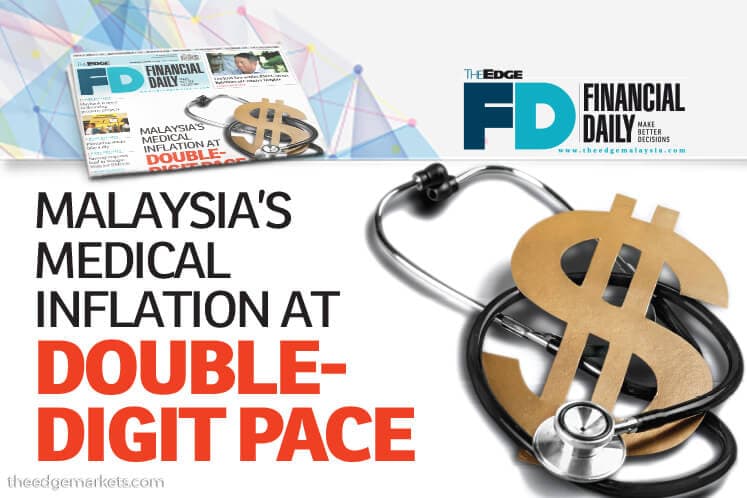
This article first appeared in The Edge Financial Daily on August 17, 2017 - August 23, 2017
KUALA LUMPUR: Beside rising food prices, Malaysians are facing double-digit healthcare inflation, according to a global survey done by consulting and broking entity Mercer Marsh Benefits, which is affiliated to Marsh Insurance Broking (Malaysia) Sdn Bhd (MIB).
Malaysia’s healthcare inflation stood at 11.5% in 2016 and is projected to rise to 12.7% this year, the survey shows. The pace is much faster than the average of 10.7% in Asia last year, and the rate is projected to ease to 10.2% this year.
In fact, Malaysia is the third-highest among the 11 Asian countries surveyed, after India’s 14% and Indonesia’s 13.1%, in terms of healthcare inflation rate. Asian countries surveyed were China, Hong Kong, India, Indonesia, the Philippines, Singapore, South Korea, Taiwan, Thailand, Vietnam and Malaysia.
The survey was conducted in 63 countries between March and May this year.
Among the reasons for the growing inflationary pressure on medical costs, the top three are increased utilisation of medical services as more people are falling sick, the growing ageing population, and the costly advancement of medical technology, said Marsh Insurance Brokers (Malaysia) Sdn Bhd’s (MIB) senior and vice-president and national practice leader Ho Mun Kiat yesterday at the 2017 Mercer Marsh Benefits seminar.
Also, Ho noted that the weak ringgit is another major factor that has fuelled the inflationary pressure on healthcare as a result of more expensive imported medical equipment and supplies.
“As medical care becomes more and more expensive, premiums [for medical insurance] will likewise increase,” Ho told the audience at the seminar yesterday.
The survey shows that healthcare inflation outpaces the overall inflation, which is usually measured by consumer price index, globally. In Asia, medical cost inflation is estimated at 10.2% compared with the overall inflation of 2.8%. In Europe, healthcare inflation is forecast to be at 6.7% versus core inflation of 2.6% this year.
Based on the top 20 clients in their study sample, Ho said the average group hospital and surgical insurance claims amounts increased by 8% to RM5,082 in 2016 from RM4,711 in 2015.
Ho said employers play an important role in influencing the continued high healthcare inflation and should seriously consider the costs and outcomes to ensure access and quality of care.
The survey also highlighted the top causes of claims based on dollar amount are cancer, gastrointestinal and intervertebral disorders, which are largely due to lifestyle choices, said Ho.
Ho explained that these “urban diseases” are due to poor eating habits, poor diet and smoking.
Rather than just focusing on providing healthcare benefits, employers should also consider preventive measures for diseases that are truly tailored. Among the suggested programmes are weight management programme and others.
He added that Malaysian employers should understand the importance of preventive measures and invest a lot more money in them. However, the adoption rate is still not fast enough.
In addition, he said that there should be equal responsibilities between the employees and corporate employers in curbing high healthcare inflation.
The survey indicated that insurers predict high consumer medical spend will continue. Hence, Ho urged that employers should have the right incentives and health culture in place to positively impact the workforce health and curb demand.
